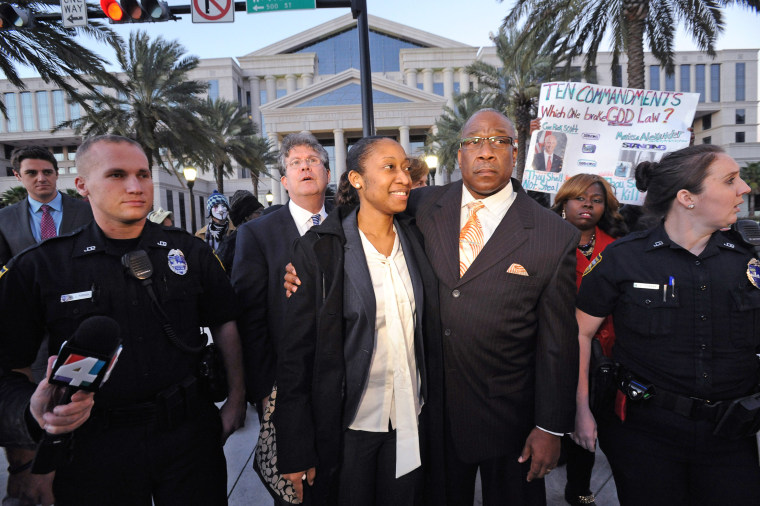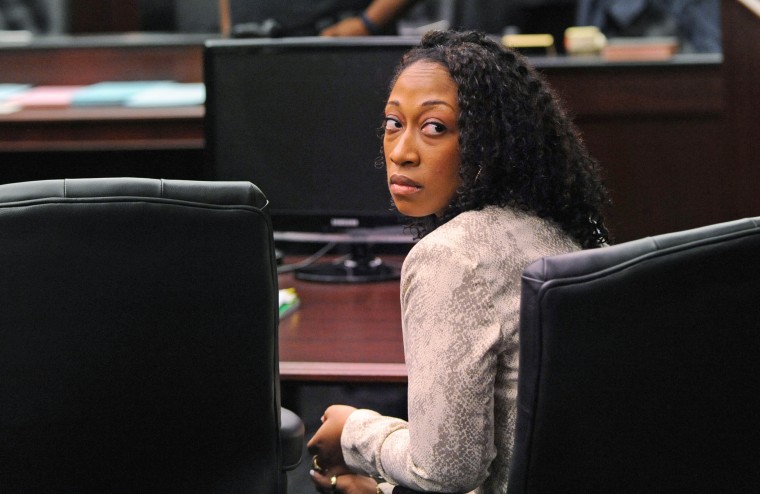When Marissa Alexander went to prison in 2012, she became a symbol of the shortcomings of Florida's stand your ground gun law.
Now that she's free, she's pushing to make it easier to use.
Alexander is a black mother who was a licensed gun owner when she shot at her estranged husband in 2010, saying she feared he'd hurt her. The bullet never even grazed the man but she was initially sentenced to up to 20 years in jail — making headlines just as George Zimmerman was famously walked free for fatally shooting young Trayvon Martin in the same state.
That perspective put her at the intersection of national debates on race, sentencing guidelines, and expanding stand-your-ground laws, which protect people who defend themselves against attackers.
Alexander, a self-described introvert whose conviction turned her into an advocate for criminal justice reform, has since sided with Florida Republicans who want to shift the burden of proof away from defendants when it comes to stand-your-ground defenses.

They're pushing through a bill that would make prosecutors have to prove that the protections shouldn't apply.
Related: Florida’s ‘Stand Your Ground’ Law Linked to Increase in Homicides, Study Finds
The measure, backed by defense lawyers and opposed by prosecutors, passed the state Senate last week. It will be discussed by a state House of Representatives committee Thursday morning.
Florida's stand-your-ground law, passed in 2005, was the nation's first. Twenty-one states have since followed. The proposed changes would make Florida's law the toughest for prosecutors — and could be a harbinger of similar changes nationwide.
One opponent, Democratic state Sen. Audrey Gibson, has called the measure a "get-away-with-murder bill."
Alexander said in an interview this week that she understands that critics believe that stand your ground laws are used to discriminate against minorities, fuel vigilantism and allow criminals to escape prosecution.
But those critics, Alexander says, haven't experienced what she has.
"I didn't get a fair shake," she said.
Alexander, who as the daughter of an Army sergeant grew up around guns, said she knew little about Florida's stand-your-ground law when she was first charged with aggravated assault after she fired at her husband during a confrontation in her Jacksonville home.
She said it was a warning shot, but a judge denied her the chance to use the stand-your-ground defense, saying she didn't do enough to prove she feared for her safety.
She went to trial, where she was convicted of aggravated assault and sentenced to a mandatory minimum 20 years behind bars.
Related: ‘Stand Your Ground’ Tested in Trial Over NFL Star’s Death
Alexander believes the current burden of proof, formalized in a 2015 state Supreme Court decision, gives the government too much power and criminalizes domestic violence victims ─ black women in particular.
"My experience was that if a defendant goes into a stand-your-ground case, they have to testify in their own defense," she said. "The burden is on you. You're already behind the eight-ball. You have to prove that you're innocent ─ you're already guilty."
Just last week, a judge rejected a retired Tampa police officer's stand your ground claim in a 2014 fatal movie theater shooting.
After Alexander's conviction, stand-your-ground advocates rallied behind her, saying the law was being applied unfairly, particularly in comparison with the 2012 shooting of Martin.
Her case also drew attention of Families Against Mandatory Minimums, which lobbied to remove aggravated assaults from crimes that carry mandatory minimum prison terms.

Alexander spent nearly three years in prison before her conviction was overturned. Rather than risk a new trial, she agreed to a plea deal that allowed her to be released to home detention. On Jan. 27, she was allowed to remove her monitoring bracelet, and was free to move around as she wished.
That meant taking her 6-year-old daughter and her 16-year-old twins ─ whom she rarely saw while in prison ─ out into public. She shares custody of the youngest child with her now-ex husband, the man she shot at. The twins are from a prior relationship.
Alexander has started a consulting business, and has accepted invitations to tell her story to audiences around the country. She's working on a memoir.
She has embraced her role as a hero in the justice reform movement, arguing for the repeal of mandatory minimum sentencing laws and speaking on behalf of domestic violence victims. She created a non-profit called the Marissa Alexander Justice Project.
And she has spoken to lawmakers in support of toughening Florida's stand your ground law.
"I think we could at least try to be as fair as possible," she said. "And when we see a situation where the scales are tipped to one side and we can make it more balanced, I think we should give it a try."
